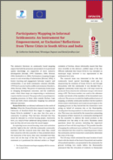|
This Opinion Piece engages with the notion of corporate social responsibility (CSR) as a core feature of emerging governance patterns in Peru. These recent reconfigurations are occurring in a context of rapid economic growth that has relied on mining as one of its main engines. The relationship between mining and society is complex in Peru, due to a long history of negative impacts that has consolidated a situation of generalized social unrest considered to be the main threat both to mining activities and the sustainability of the current economic growth model.
CSR takes various forms, from pure ‘philanthropic’ behaviour to more ‘business case’ orientations (aimed at enhancing profits). Although in theory CSR can be undertaken in any business sector, the mining sector appears as a ‘natural’ choice due to the high degree of negative externalities. As has occurred in other mining and oil export dependent countries, CSR in Peru has been explicitly included in a new natural resource policy agenda that aims to bring mining benefits closer to local governments and populations. This agenda has involved transferring regulatory powers from the state to private actors, with regard to taxation, for instance. Corporations can choose to provide public services in lieu of paying taxes. With regard to environmental protection too, mining corporations can carry out compensation policies and projects with no involvement of local governments. The implementation of this agenda has consolidated corporate self-regulation since the reform has no counterpart for empowering sub-national governments whose financial and managerial capacities remain heavily constrained.
Chance2Sustain Opinion Series - ISSN 2308-0965 |
Recent Chance2Sustain PublicationsMegaprojects and Urban Development in Cities of the South by Loraine Kennedy et al.
Traveling Concepts in Megaproject Building by Loraine Kennedy and Glen Robbins
Sustainable Data Science for Sustainable Cities: Big Data and the Challenge of Urban Development by Linnet Taylor
Participatory Mapping in Informal Settlements: An Instrument for Empowerment, or Exclusion? Reflections from Three Cities in South Africa and India by Catherine Sutherland et al.
Mapping as Tool to Understand Urban Inequalities by Isa Baud and Karin Pfeffer |
|
|
|
|
|

